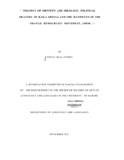| dc.description.abstract | The present study was determined to show how power relations, the notion of identity and the notion of ideology and how they are manifest in the written political speeches of Raila Odinga. In particular, the notion of identity was examined in the frontier of how the change in the roles of the tenor, in this case the speaker and other participants automatically determine the type of identity that he speaker seeks to cast to his audience for the purposes of textual and contextual relevance in time and space. The concept of ideology on the other hand is expressed as 'common sense' through opaque discursive relationships that outline the ideas and beliefs of the speaker which are context dependent and mostly persuasive.
The approaches to Critical Discourse Analysis proposed by Norman Fairclough, Ruth Wodak, and Teun Vandjik among others informed the theoretical frameworks of this study. The approach of CDA proposes that language should be studied as a social practice, where, the use of language is directed by the objectives of the discursive events hence the dynamism with which the re-introduction of similar concepts can adopt new strategies in different environments through re-contextualization as a recourse of text reproduction. Specifically, it proposes that Linguistics should be integrated into the daily experiences and challenges of social life particularly the role that is played by language in shaping social relationships.
The general framework of the study is outlined in chapter one in the introduction, statement of the problem, the objectives and the hypotheses guiding this study, theoretical approach used, the methods of data collection and, review of the existing literature and the rationale of the study. In chapter two, the elaborate theoretical concepts of Critical Discourse Analysis (CDA) adapted in this study is discussed at length. The key terms and definitions used in this
study are also outlined in this chapter.
The main arguments in this study are outlined in chapter three and four. Chapter three focuses on the notion of identity as is expressed by the subject ofthis (Raila Odinga) study within time and space. In chapter four, the notion of ideology is discussed as it is manifested in the texts. Research findings and the proposals for further research are outlined in chapter five. The major findings of this study were: Raila Odinga uses the pronominal, the anaphor, and the cataphor as forms of identity in his political speeches. Secondly, as a stylistic strategy, Raila Odinga uses the emotive language and marked terminology in his speeches to create the binary oppositions that define the in-groups and the out-groups in social discourses. And lastly, power relations are embedded in ideology and identity as marks of dominance, discrimination and abuse in the societal structures. | en_US |

